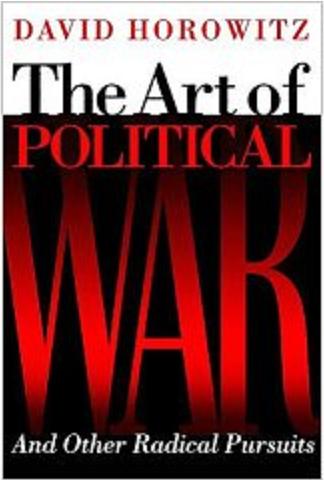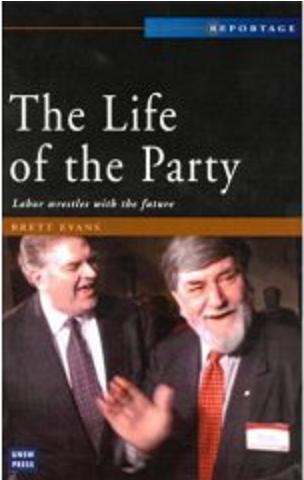The Art of Political War
by David Horowitz
Spence Publishing, Dallas, 224 pp, $50

Ask not what you can do for your country but what your government can do for you. This inversion of the famous lines of JFK's speechwriter might be the operating slogan of the middle-to-Left ALP, the Australian Democrats, the union bureaucracy, the broadsheet press, allies (and, frequently, close relatives) in the ABC, and the arts/ social sciences commentariat from our leading universities.
This was the cohort which greeted with both incredulity and hostility Peter Costello's recent call for the fostering of civic virtues, such as care for one's neighbours and the donation of time and effort to community activities.
Costello and his Party quickly found that to advance the notions that government is and should be limited, that the interaction of neighbours, families, and community groups is the foundation of the good society, is to open up a vulnerable flank to the slogans of the broad Left, with its practised use of verbal weapons such as "uncaring", "neglecting the under-privileged", "preferring economics to people".
Which brings us to David Horowitz, a name some will remember from the 1960s and 1970s when he led radical movements supporting Mao, Ho Chi Minh, Castro, George McGovern, Jane Fonda, and a student/ blacks revolution in the USA. He once organised a school for the children of the Black Panther Party. He was also an editor of Ramparts, the most influential magazine of the American Left.
His autobiography, Radical Son, tells the important story of his progress from radical student activist against pluralism and market economies, to promoter of the good sense in the motives and policies of John Locke, Adam Smith, and James Madison. (Can any reader let me know if these three greats are seriously taught in any Australian university?) He is still a regular contributor to the leftist Internet magazine Salon.
The Art of Political War is his latest book on US political life, but much of it applies to the situation in Australia, Britain, or Germany (where the ruling Social Democratic Party is organising a partnership deal with the former Communists of East Berlin). His urgent proposition is that the US liberal/ socialist alliance is, overall, winning the debate and the strategic power that follows, on a wide range of public policies, from education to public safety to the size and intrusion of the government sector.
A number of his observations, intended to advise American Republicans, have application to Australia:
- Every issue that (most) Democrats contest is coloured in their minds by the larger purpose of redeeming the world through government.
- When Democrats speak politically, every other word is a public device to seem to be on the side of the angels: an appeal to "minorities", "working Americans", "women", "poor children".
- Republicans, by contrast, tend to speak in abstract language about legalistic doctrines and economic budgets, sounding like lawyers and accountants.
- Through these devices, Clinton trounced the Republicans over vastly increasing the Federal education budget, even though most of the extra spending ended up in the hands of the education bureaucracy and not the children.
- The Democrat leadership doesn't try to wipe its toughest opponents in debate, it aims to wipe out, period: for example, a litany of false charges against Newt Gingrich, which the East Coast media relentlessly repeated (Gingrich was ultimately cleared on every count, but ruined in the process); the Democrat attacks on prosecutor Kenneth Starr until it seemed that he, and not Clinton, was on trial; the smear campaign against Judge Clarence Thomas as a warning to all black leaders not to leave Democrat territory.
- The common understanding that the Constitution sets limits to what government may do has broken down, as "rights" are manufactured, progressives are appointed to the benches, and Democrat lawyers stake out new ground throughout the republic.
- The key Left Democrat program is to redistribute the tax impositions on individuals, families, and enterprises, on the basis of political prejudice.
- The political war as outlined above is also a culture war, as the Left Democrats move through the parliaments, public offices, the media, teaching institutions, and even the benevolent foundations set up by business entrepreneurs.
Australian Liberals and US Republicans suffer another political disadvantage. As Horowitz explains, US Democrats enter party politics out of socialist-type organisations, trade unions, social crusades about various minority rights, etc. "They are combat-ready before they begin their political careers". (See how easily the three former ACTU leaders moved into Canberra Labor's Shadow Cabinet).
Generally, US Republicans want to manage or even roll back the umbrella of political institutions; whereas Democrats want to transform them. Republicans want to fix government; Democrats want to fix the world.
It is interesting that four Australian Federal Liberal Prime Ministers are lawyers. Menzies was a lawyer, and so were Holt and McMahon. Each of them is or was skilled in verbal attack and defence. Menzies and Howard have shown an ability to connect with significant elements of the community: "the forgotten people", Menzies women's support groups, Howard's "battlers", small business groups (until Treasury and the Tax Office were allowed to take control of BAS, IAS, issues affecting independent contractors, etc).
But none of these leaders has been able to articulate an attack on big Government, or an attack on Labor's social crusades, which connect with the public. Liberals are good at debating points, but not social issues. Keeping it simple is not easy.
The connection between fast-rising government spending, inflation, and unemployment became clear to the wider public during the Whitlam/Cairns years, through harsh experience. The connection between high taxation, government waste, and capital and intellectual flight, is not yet apparent to most people who depend on shortish TV, radio, and newspaper items and headlines for their political intake.
Clearly, "Taxation Breaks for Big Business and Investors" is a policy item which will be savaged and lampooned in the middle-brow media. But Horowitz demands that conservatives and Republicans make a massive effort to connect. "Tax Breaks for Families, Cuts in Washington's [Canberra's] Bureaucracy", are the kind of things he would recommend.
Education is one of his prime examples of how Democrats make a plus of a minus. "Millions of black, Hispanic, and other 'minority' (but not Chinese) youths leave school without being able to read English or multiply 10 by 11". There are a number of reasons for this, including the public sector education unions refusing tests for children on the way through, as well as their refusal to accept career supervision of teachers.
The Democrat answer is more and more government funding. The Republican reaction is inevitably reported as "Republicans Refuse Money for Schools" or some such. Not a winner. Shades of Australian reports of "More Grants to Private Schools", when the great increase in public funding overall was to government and poorer schools.
As Horowitz points out, although public education is a big Democrat plus issue, none of the Democrat Congress leaders or education policy promoters sends his/her children to a government school. The attack should be, he says: why do they condemn the children of minorities to the failed school system which their biggest supporter group runs? Easily said, but winning that war needs careful policy preparation, a national frontal attack, persistence, and sharp words.
Horowitz proposes that the Republican Party and its general supporter base must fight on a broader cultural front. Rather than just defending their own views on individual and commercial liberties, and the virtues of the balanced budget, etc., they should be out attacking the Left/Democrat alliance for condemning black children to poor schools and violence ("Guns Don't Kill Blacks, Other Blacks Do"); and for advocating a health system which would abolish the family doctor.
Horowitz doesn't mention it, but a new term called "Capitulation Conciliation" has entered the vocabulary of PR. The syndrome is also called "Cave-In Conciliation". If attacked by Greens or radicals of any kind, companies are encouraged to phone their friendly PR company, which will arrange the terms of their surrender. As one PR director said, "You can't fight them, because they get all the good press".
Large and productive public companies (mostly owned by workers' superannuation funds, middle-class families, and the elderly retired) rolling over to dark Greens, Trotskyites, and even Stalinists: these do not make a pretty sight, though they are making one that is becoming more common. It is a lot to ask of Liberal, Conservative, and Republican Parties to carry this extra load.
The parties of the democratic market and limited politics need to harness themselves to community organisations, international traders, smaller business, the professions which have not attached themselves to big government, aspirational voters (who want good schools and lively local scenes), and the independent trades and contractors (fortunately a fast-growing lot).
Above all, says Horowitz, they must recognise that they are involved in a culture war. Language and symbols are mighty weapons in this war. The Left has fought hard for the monopoly on "caring", "compassion", "public", "social funding", etc., even though its policies lead to illiterate school graduates, a raft of government benefactions to middle-class cronies, harassment of independent workers and innovators, endless litigation by insiders, and an increase in impersonal bodies and controls. (Would you rather be cared for by the Department of Social Something or the Salvation Army?)
By "public", of course, they mean "government". Social funding can mean "caring" policies, like granting educated and vocal operators with some Aboriginal ancestry the funds which should go to poor communities of mostly or full Aboriginal ancestry. By "compassion" they mean offering heroin-injecting facilities to suffering creatures who need immediate hospital treatment. All this needs to be said loudly, and better.



